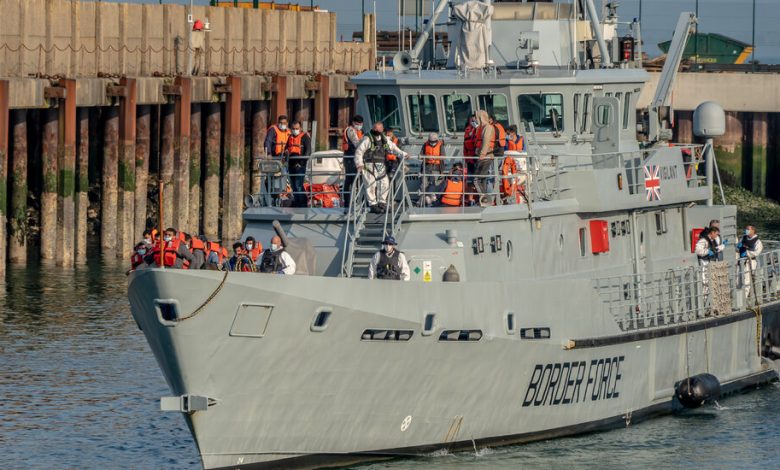U.K. Court Upholds Policy to Deport Asylum Seekers to Rwanda

LONDON — The High Court in London on Monday ruled in favor of the government’s highly contentious policy to deport asylum seekers who arrive in Britain by boat to Rwanda, but it also said that eight specific deportation cases should be reconsidered.
The policy, which is intended to help deter those crossing the English Channel in small boats from making the journey, comes at a time when some Western nations are taking tougher stands against accepting refugees.
Human rights defenders say that the policy would violate international law and would not deter those risking the dangerous journey. An appeal of the ruling is likely.
Under a deal with Rwanda, Britain is paying more than 120 million pounds, or about $147 million, to finance opportunities for those sent to the small African nation, including education and training in job skills and languages. Those who were granted asylum in Rwanda would not be able to return to Britain.
The policy has already faced a number of complications and setbacks since it was introduced in April by Priti Patel, then the home secretary.
The initial announcement raised anxiety among asylum seekers, was denounced by many opposition lawmakers and prompted major concerns among international rights groups.
In June, a small number of people who had arrived in Britain by boat were told that they would be sent to Rwanda. But the orders were challenged, and the flight was ultimately grounded. The plan was left in further disarray when a charter airline pulled out, but the government vowed to press on.
It is still unclear exactly how the government would carry out its plan. Asylum seekers, many of whom fled war zones and then underwent dangerous journeys to reach Britain, say the ambiguity is an additional burden that weighs heavily on them.
The court’s decision comes soon after Britain and France signed a new agreement to stem the growing number of small boats carrying migrants over the busy waterway between them.
The total number of people arriving by small boat across the English Channel this year has surpassed 40,000, according to preliminary figures from the Ministry of Defense.
The topic of the crossings has remained a focal point of the governing Conservative Party’s messaging around immigration, even as it has endured a tumultuous year that has seen three prime ministers in quick succession.
Suella Braverman, the home secretary, said in October that it would be her “dream” to have a flight with asylum seekers leave for Rwanda before Christmas.
The Home Office has maintained in multiple statements that Rwanda is a “safe and secure country with a strong track record of supporting asylum seekers,” and that it would “continue to robustly defend the partnership in the courts.”
But rights groups have repeatedly raised concerns about Rwanda’s human rights record, even as it positions itself as a partner for Western nations. Lewis Mudge, the Central Africa director at Human Rights Watch, said that the judicial process had made it “abundantly clear” that Britain’s Home Office and Foreign Office were both fully aware of Rwanda’s “abysmal rights record.” By turning a blind eye to evidence of extrajudicial killings, torture, political repression and more, Britain is “emboldening the Rwandan authorities to continue to commit abuse unabated,” he said.
“The choice to enter into an asylum partnership with a government that takes pride in the assassinations and renditions of political opponents abroad, some of whom had refugee status at the time, shows just how far the U.K. is willing to go to shirk its own responsibilities to asylum seekers,” Mr. Mudge added.
And they have been highly critical of the British government’s use of vitriolic messaging around the crossings, which make up a fraction of the number of people arriving in the country.
The case against the government was brought by the charity group Asylum Aid, and is one of several that have challenged the legality of the policy.
In a September hearing in another case brought by aid groups, individuals and a union representing border-force officers, the High Court heard evidence that the government’s own advisers had warned against introducing the plan over fears it was most likely in contravention of international law.
Emma Stevenson, the deputy chief executive officer of Choose Love, a charity based in Britain that provides aid for refugees, said that the organization had helped fund the Asylum Aid case because it saw the government policy as affecting human rights.
“For somebody to arrive in the U.K. and then be threatened with being sent to Rwanda without any kind of proper follow-up or support just feels really inhumane,” Ms. Stevenson said in an interview before the court decision was announced.
She said that the messaging coming from the British government had been particularly dangerous, and that she feared it was worsening a climate of intolerance.
“It’s a really concerning problem that I think exacerbates the polarization,” Ms. Stevenson said. “We need to come together and find solutions together, because it’s not impossible to solve.”
Stephen Castle contributed reporting from London, and Abdi Latif Dahir from Nairobi, Kenya.
